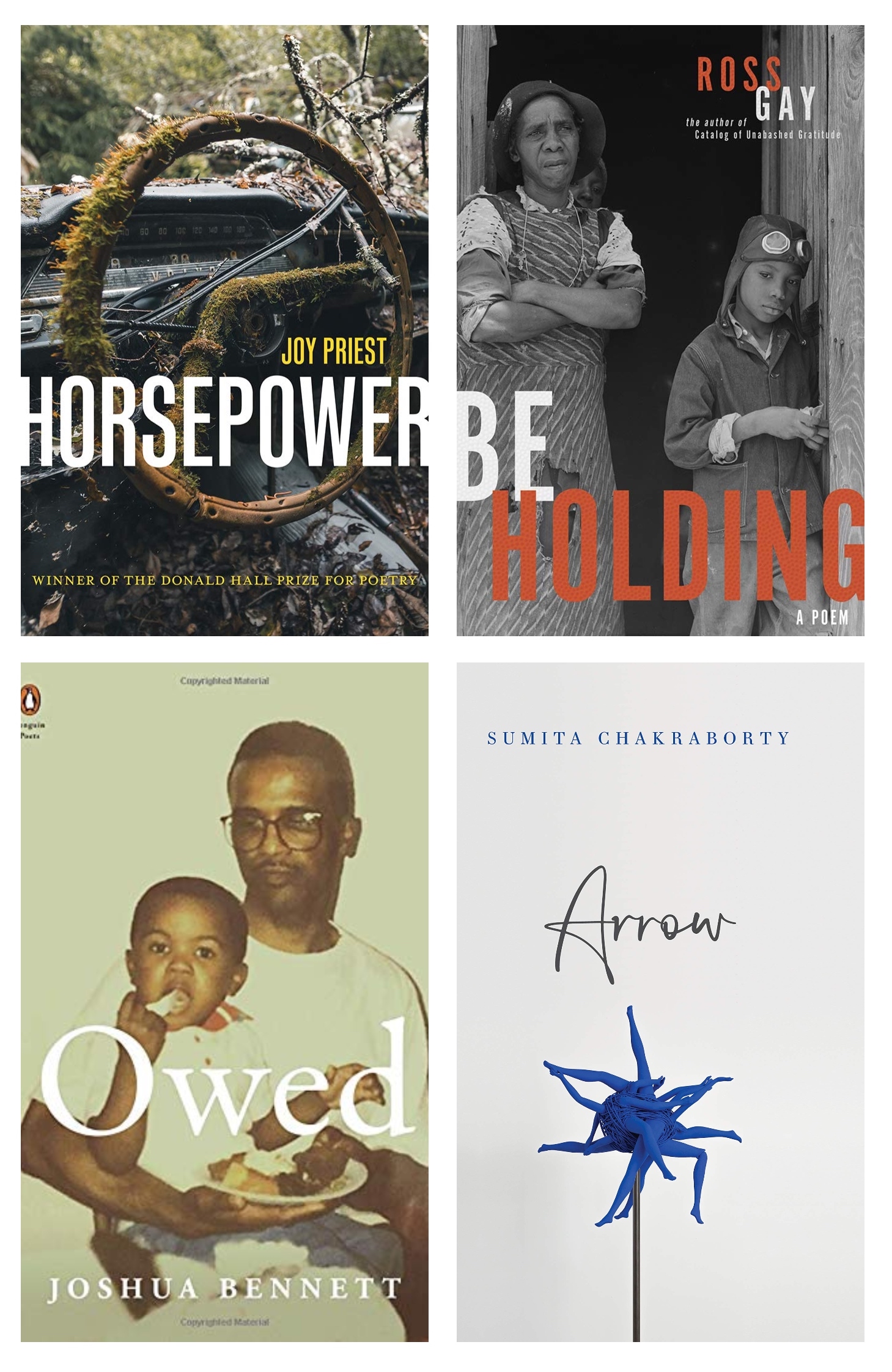Here are nine notable books of poetry publishing this month.
Horsepower by Joy Priest
 One of the best debuts of the year. An early poem, “American Honey,” begins: “It’s easier than you thought—leaving.” Two moves here—the second-person framing and the em dash—give the line power and profluence. From the start of this book, Priest is a captivating guide. “Your long-built dread / dispersing like gas into a brilliantly Black / Appalachian sky” portends a recurrent theme of narrator-as-phantom, of transfigured characters. Her storytelling sense is formidable: “Now you can be a girl / on the back patio with three white men & you can leave / with their money, egg suede cowboy hat adorning your dreads.” Pitch-perfect lines abound, as in “Blue Heart Baby”: “Every piece / of advice is one the giver followed to his own // bitterness.” Priest is so adept at sketching place; elsewhere she writes “The darkness / up to our chins. The sky // a bowl of blinking lights above us.” Priest shows that mimesis is about feeling more than realism—the world wobbles while it spins, and her lines have a preternatural ability to reflect this. From “Self-Portrait as Disney Princess”: “Your only friends the carpenter bees who bear perfectly round holes / In the carport’s rotting wood frame & dance in socked feet // Glittering with pollen, the hummingbirds hovering at your head / Like a crown.” She’s equally adept at sketching scenes. In one poem, the narrator is sitting in “my mother’s white Plymouth” below the “Hollywood Video’s fanatic purple lights— // Their appliance buzz.” Her mother, inside the story, has been “stunned-still at the sight of my father, // Possibly a mirage.” The narrator’s father is an arresting character in Horsepower. “He sees the world in us. / Knows the huge, abstract names // for emotions, when it comes to plants, / but not his own self.” He’s a phantom in his own way, and when we read lines from the final poem—“I’m leaving / & being left. Looking for you / In all your haunts”—their worlds unite.
One of the best debuts of the year. An early poem, “American Honey,” begins: “It’s easier than you thought—leaving.” Two moves here—the second-person framing and the em dash—give the line power and profluence. From the start of this book, Priest is a captivating guide. “Your long-built dread / dispersing like gas into a brilliantly Black / Appalachian sky” portends a recurrent theme of narrator-as-phantom, of transfigured characters. Her storytelling sense is formidable: “Now you can be a girl / on the back patio with three white men & you can leave / with their money, egg suede cowboy hat adorning your dreads.” Pitch-perfect lines abound, as in “Blue Heart Baby”: “Every piece / of advice is one the giver followed to his own // bitterness.” Priest is so adept at sketching place; elsewhere she writes “The darkness / up to our chins. The sky // a bowl of blinking lights above us.” Priest shows that mimesis is about feeling more than realism—the world wobbles while it spins, and her lines have a preternatural ability to reflect this. From “Self-Portrait as Disney Princess”: “Your only friends the carpenter bees who bear perfectly round holes / In the carport’s rotting wood frame & dance in socked feet // Glittering with pollen, the hummingbirds hovering at your head / Like a crown.” She’s equally adept at sketching scenes. In one poem, the narrator is sitting in “my mother’s white Plymouth” below the “Hollywood Video’s fanatic purple lights— // Their appliance buzz.” Her mother, inside the story, has been “stunned-still at the sight of my father, // Possibly a mirage.” The narrator’s father is an arresting character in Horsepower. “He sees the world in us. / Knows the huge, abstract names // for emotions, when it comes to plants, / but not his own self.” He’s a phantom in his own way, and when we read lines from the final poem—“I’m leaving / & being left. Looking for you / In all your haunts”—their worlds unite.
Be Holding by Ross Gay
 The lyrical elements of basketball—hardwood and asphalt, hustle and strain—couldn’t find a better laureate than Gay. Sports, in the end, are about controlling our bodies, bending them toward our wills (especially basketball, in the constrained space). Be Holding is a book-length paean to Dr. J., among other wonders. Gay’s collection includes a hilarious early footnote for the uninitiated to Julius Erving (“You could just look on any of the video algorithim machines…or, better yet, you could just ask an elder.”). Gay invites us into his process, as the clip of Dr. J’s baseline levitation in the 1980 NBA Finals becomes a source of meditation, a recursive fount of energy. He ponders the typical admonition of frustrated coaches: “keep your feet! / again and again, // which makes the leaping—leaving your feet— / sound sacrificial.” Like the doctor himself, Gay’s ability to linger in a moment captures the richness of basketball-as-story: “—have you ever decided anything / in the air?—” The classic video clip brings Gay to other places, times, and subjects, including his youth. “I, too, am a docent / in the museum of black pain,” he writes. “my own white mother // how many times told / by white people // that brown child is not yours, / that curly-headed sun-loved thing // you nurse and whose ass / you wiped the shit from // and whose very body you bore / of your florid gore.” Gay delivers beautiful lines throughout: “my body is made of my father,” he notes: “I sometimes will study // my own hands, / which are his hands, // recalling the way he held / my brother’s and my heads // through the crosswalk.” A unique work of form and substance.
The lyrical elements of basketball—hardwood and asphalt, hustle and strain—couldn’t find a better laureate than Gay. Sports, in the end, are about controlling our bodies, bending them toward our wills (especially basketball, in the constrained space). Be Holding is a book-length paean to Dr. J., among other wonders. Gay’s collection includes a hilarious early footnote for the uninitiated to Julius Erving (“You could just look on any of the video algorithim machines…or, better yet, you could just ask an elder.”). Gay invites us into his process, as the clip of Dr. J’s baseline levitation in the 1980 NBA Finals becomes a source of meditation, a recursive fount of energy. He ponders the typical admonition of frustrated coaches: “keep your feet! / again and again, // which makes the leaping—leaving your feet— / sound sacrificial.” Like the doctor himself, Gay’s ability to linger in a moment captures the richness of basketball-as-story: “—have you ever decided anything / in the air?—” The classic video clip brings Gay to other places, times, and subjects, including his youth. “I, too, am a docent / in the museum of black pain,” he writes. “my own white mother // how many times told / by white people // that brown child is not yours, / that curly-headed sun-loved thing // you nurse and whose ass / you wiped the shit from // and whose very body you bore / of your florid gore.” Gay delivers beautiful lines throughout: “my body is made of my father,” he notes: “I sometimes will study // my own hands, / which are his hands, // recalling the way he held / my brother’s and my heads // through the crosswalk.” A unique work of form and substance.
Arrow by Sumita Chakraborty
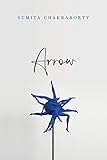 Gifted in the art of the long poem, Chakraborty, also includes dialogic poems, epigrammatic pieces, and verse essays (with appearances by Foucault, Spinoza, and Dürer)—all pieces touched with the elegiac. In an early segmented prose poem, she offers an apostrophe to the reader: “I am also writing his poem as a fable because at times I have been afraid to speak of myself, and lately it has become important to me to learn how to respect that my earliest affections for abstraction were by way of disguise.” Now, she writes, “I tend to think of obstruction and clarity alike as acts of definition.” A centerpiece of the collection is her masterful long poem “Dear, Beloved”: “Sister, I know neither goodness nor mercy shall follow me / all the days of my life, as surely as I know the beasts / I inherit or create, of all unions familial or otherwise, / are speechless and brute, and bound to die soon.” Some lines that stopped me: “The secret / about lullabies: when they work, it’s because they sound / like something plants would sing in Hades, on the banks / of the river dark.” In the book’s final poem, Chakraborty writes “There is a space in my body that did / not exist when I began this book. It / is a window. When I next speak, I / will do so through that window”—and it feels absolutely true.
Gifted in the art of the long poem, Chakraborty, also includes dialogic poems, epigrammatic pieces, and verse essays (with appearances by Foucault, Spinoza, and Dürer)—all pieces touched with the elegiac. In an early segmented prose poem, she offers an apostrophe to the reader: “I am also writing his poem as a fable because at times I have been afraid to speak of myself, and lately it has become important to me to learn how to respect that my earliest affections for abstraction were by way of disguise.” Now, she writes, “I tend to think of obstruction and clarity alike as acts of definition.” A centerpiece of the collection is her masterful long poem “Dear, Beloved”: “Sister, I know neither goodness nor mercy shall follow me / all the days of my life, as surely as I know the beasts / I inherit or create, of all unions familial or otherwise, / are speechless and brute, and bound to die soon.” Some lines that stopped me: “The secret / about lullabies: when they work, it’s because they sound / like something plants would sing in Hades, on the banks / of the river dark.” In the book’s final poem, Chakraborty writes “There is a space in my body that did / not exist when I began this book. It / is a window. When I next speak, I / will do so through that window”—and it feels absolutely true.
Blizzard by Henri Cole
 A bee swarms out of a black-red peony, and “I am waving / my arms to make you go away. No one / is truly the owner of his own instincts, / but controlling them—this is civilization.” While peeling potatoes, “I put my head down,” and “I feel a connection across / time to others putting their heads down / in fatigued thought.” Black mushrooms are found, and “Sometimes, / when I’m suffocating from an atmosphere of restraint / within myself, I fry them up in butter, with pepper and salt, / and forget where the hurt came from.” The early poems in Blizzard immediately establish a hypnotic refrain of syntax and focus—no easy feat for a poet to wrest us from the world that quickly, and let us live elsewhere awhile. From “To a Snail”: “It’s a long game— / the whole undignified, insane attempt at living— / so I’ve relocated you to the woods.” His typically concise form never feels inert or bloodless: there’s a sense of poetic calmness or transcendence to his method of staying in a moment and watching, contemplating, speaking. His lines arrive within the tunnel of each poem, but feel like little gifts to carry elsewhere: “Time is short. / If tenderness approaches, run to it.” The book’s second section pivots to an earthly, funereal concern about decaying bodies and anxiety. A gray and white dove that slammed dead into a picture window: “We buried it—in some distorted version of its normal self— / folded in a white cloth napkin in the backyard. / Still soft enough to be cut into like a cabbage, I thought, / I’m glad I’m not dead.” “Agnostic and uninsured,” a later narrator laments, “I eat celery, onions, / and garlic—my Holy Trinity of survival.” These lamentations take a different, more sensuous turn in the third section: “Sometimes, a friend cooks dinner; our lives commingle. / In loneliness, I fear me, but in society I’m like a soldier / kneeling on soft mats.”
A bee swarms out of a black-red peony, and “I am waving / my arms to make you go away. No one / is truly the owner of his own instincts, / but controlling them—this is civilization.” While peeling potatoes, “I put my head down,” and “I feel a connection across / time to others putting their heads down / in fatigued thought.” Black mushrooms are found, and “Sometimes, / when I’m suffocating from an atmosphere of restraint / within myself, I fry them up in butter, with pepper and salt, / and forget where the hurt came from.” The early poems in Blizzard immediately establish a hypnotic refrain of syntax and focus—no easy feat for a poet to wrest us from the world that quickly, and let us live elsewhere awhile. From “To a Snail”: “It’s a long game— / the whole undignified, insane attempt at living— / so I’ve relocated you to the woods.” His typically concise form never feels inert or bloodless: there’s a sense of poetic calmness or transcendence to his method of staying in a moment and watching, contemplating, speaking. His lines arrive within the tunnel of each poem, but feel like little gifts to carry elsewhere: “Time is short. / If tenderness approaches, run to it.” The book’s second section pivots to an earthly, funereal concern about decaying bodies and anxiety. A gray and white dove that slammed dead into a picture window: “We buried it—in some distorted version of its normal self— / folded in a white cloth napkin in the backyard. / Still soft enough to be cut into like a cabbage, I thought, / I’m glad I’m not dead.” “Agnostic and uninsured,” a later narrator laments, “I eat celery, onions, / and garlic—my Holy Trinity of survival.” These lamentations take a different, more sensuous turn in the third section: “Sometimes, a friend cooks dinner; our lives commingle. / In loneliness, I fear me, but in society I’m like a soldier / kneeling on soft mats.”
Owed by Joshua Bennett
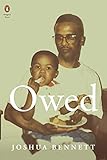 “You contain / multitudes & are yet / contained everywhere you go.” From “Token Sings the Blues”—the first poem in Bennett’s skilled collection—on forward, Owed is a song of identity. An affirmation of how the narrator’s sister says “You. are everything” and the honest melancholy that “on your best / days above ground you / believe her.” In “Barber Song,” Bennett sings of “Postmodern blackness black / -smith,” how someone can make “a cut so close you could see / the shimmer of a man’s thinking.” How the barber is a “biweekly / psychoanalyst, first stop / before funeral, before / wedding & block party.” Yet there’s also a finely tuned sense of entropy in this book: “I’m pretty good / at not loving / anything enough / to fear its ruin. / The cruel speed / of our guaranteed / obsolescence suits / me.” One way against the storm, one measure of survival, is “how I lend my hands / to lyric’s labor, as if forsythia / or chrysanthemum could bloom from black / ideas dancing across a screen.” Bennett manages to do so with pieces that are nearly hymnal, as with “Mike Brown is a Type of Christ”: “By which I mean, mostly, that we gaze upon the boy / & all of our fallen return to us, their wounds unhealed / & howling.” And in one of the sections of the “Reparations” sequence: “But what modern-day / black son wasn’t born / knowing how to pray?” Bennett ends with a poem that follows Langston Hughes, and is much about America as it is about being a father and son, and about dogged hope for “some vast and future country / some nation within a nation.”
“You contain / multitudes & are yet / contained everywhere you go.” From “Token Sings the Blues”—the first poem in Bennett’s skilled collection—on forward, Owed is a song of identity. An affirmation of how the narrator’s sister says “You. are everything” and the honest melancholy that “on your best / days above ground you / believe her.” In “Barber Song,” Bennett sings of “Postmodern blackness black / -smith,” how someone can make “a cut so close you could see / the shimmer of a man’s thinking.” How the barber is a “biweekly / psychoanalyst, first stop / before funeral, before / wedding & block party.” Yet there’s also a finely tuned sense of entropy in this book: “I’m pretty good / at not loving / anything enough / to fear its ruin. / The cruel speed / of our guaranteed / obsolescence suits / me.” One way against the storm, one measure of survival, is “how I lend my hands / to lyric’s labor, as if forsythia / or chrysanthemum could bloom from black / ideas dancing across a screen.” Bennett manages to do so with pieces that are nearly hymnal, as with “Mike Brown is a Type of Christ”: “By which I mean, mostly, that we gaze upon the boy / & all of our fallen return to us, their wounds unhealed / & howling.” And in one of the sections of the “Reparations” sequence: “But what modern-day / black son wasn’t born / knowing how to pray?” Bennett ends with a poem that follows Langston Hughes, and is much about America as it is about being a father and son, and about dogged hope for “some vast and future country / some nation within a nation.”
The Math Campers by Dan Chiasson
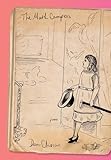 An ambitious new book, as Chiasson plays and prods with time, source, structure, and the spectacle of creation. The book’s first poem, a consideration of a 2017 mural by the artist David Teng Olsen, begins the fracturing—“Through his eyes I see in the dark. / I see through change the static”—which ends with the narrator’s son questing Chiasson’s cover of Bicentennial. Fathers and sons become an emblem for this book, which begins with a poem in four phrases—a porous narrative of fragments, dreams, and daydreams. There’s a self bursting against the world here (Chiasson has said in an interview: “I’m fascinated by the inner life as a social fact, a competing fact, as real as the weather or the news.”). T.S. Eliot haunts these poems well (“I owned ‘East Coker’ on cassette. / We’re close to Middlebury now, I pause / and ask my girlfriend how she likes / the line, In my beginning is my end.” “Over and Over,” the final section of the initial poem, invites the reader to “turn over / her hands to expose her palms,” and to later step away from the page and screen and “ponder who imagined whom.” The titular poem bleeds across adolescent wonders. While the Circus Camp “patches its tents” and at the Farm Camp, “a goat behind a wire fence / prepares to be clumsily milked,” the “Hard problems at the Math Camp wait / all winter for solutions; / engorged sums hibernate / and dream of consolation.” The ultimate equation is youth: “the absolute value of fifteen / or how the summer might expand / and prove eternal by division / of days into hours, minutes, seconds.”
An ambitious new book, as Chiasson plays and prods with time, source, structure, and the spectacle of creation. The book’s first poem, a consideration of a 2017 mural by the artist David Teng Olsen, begins the fracturing—“Through his eyes I see in the dark. / I see through change the static”—which ends with the narrator’s son questing Chiasson’s cover of Bicentennial. Fathers and sons become an emblem for this book, which begins with a poem in four phrases—a porous narrative of fragments, dreams, and daydreams. There’s a self bursting against the world here (Chiasson has said in an interview: “I’m fascinated by the inner life as a social fact, a competing fact, as real as the weather or the news.”). T.S. Eliot haunts these poems well (“I owned ‘East Coker’ on cassette. / We’re close to Middlebury now, I pause / and ask my girlfriend how she likes / the line, In my beginning is my end.” “Over and Over,” the final section of the initial poem, invites the reader to “turn over / her hands to expose her palms,” and to later step away from the page and screen and “ponder who imagined whom.” The titular poem bleeds across adolescent wonders. While the Circus Camp “patches its tents” and at the Farm Camp, “a goat behind a wire fence / prepares to be clumsily milked,” the “Hard problems at the Math Camp wait / all winter for solutions; / engorged sums hibernate / and dream of consolation.” The ultimate equation is youth: “the absolute value of fifteen / or how the summer might expand / and prove eternal by division / of days into hours, minutes, seconds.”
Wonder & Wrath by A.M. Juster
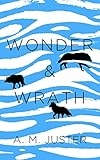 “Wood sways and mutters; palsied shutters bang. / The call has come.” “November Requiem” rests nearly in the middle of Wonder & Wrath, the poet and translator Juster’s latest, but radiates throughout the book. Juster is a poet of control—carefully pared lines whose concision creates profluent energy, as in the start of “Behold”: “Let the state highway cleave cold, stubbled fields / so that both empty lanes extend like grace.” That feeling carries the end of “Epilogue”: “There are no robins hymning / or gawkers at this scene— / only a lowered sun, / raw cries of crows, and dimming.” A particular standout here is “Inertia”: “High glinting leaves, / glazed by the post-storm light, / are hushing dark / in reassuring waves.” The calming of gl and s sounds lull the reader into an elegiac state, followed by “Our lichen-clad / old maple lost three limbs / to rain that felt / like reprimands from God.” In Juster’s work, the divine is present (and omnipresent), as well as the sense that our existence is part of a sometimes confounding by always certain scheme. “The world turns liquid,” he begins “Vertigo,” as it “reels and rolls, / as gravity // veers at angles.” His insights are often welcome, as in “Fruit Flies,” which opens with a useful reminder: “They are the best, as pest invasions go: / no bites and no disease, just clouds of small / tan smudges spawned in week-old grapes.” Although they “flit and frustrate,” and “outsmart you with their tiny brains,” just pour “some white wine into a dish, and wait.” They cannot resist. “They soak in joy, relax, then drink no more / It’s no surprise—you’ve seen it all before.”
“Wood sways and mutters; palsied shutters bang. / The call has come.” “November Requiem” rests nearly in the middle of Wonder & Wrath, the poet and translator Juster’s latest, but radiates throughout the book. Juster is a poet of control—carefully pared lines whose concision creates profluent energy, as in the start of “Behold”: “Let the state highway cleave cold, stubbled fields / so that both empty lanes extend like grace.” That feeling carries the end of “Epilogue”: “There are no robins hymning / or gawkers at this scene— / only a lowered sun, / raw cries of crows, and dimming.” A particular standout here is “Inertia”: “High glinting leaves, / glazed by the post-storm light, / are hushing dark / in reassuring waves.” The calming of gl and s sounds lull the reader into an elegiac state, followed by “Our lichen-clad / old maple lost three limbs / to rain that felt / like reprimands from God.” In Juster’s work, the divine is present (and omnipresent), as well as the sense that our existence is part of a sometimes confounding by always certain scheme. “The world turns liquid,” he begins “Vertigo,” as it “reels and rolls, / as gravity // veers at angles.” His insights are often welcome, as in “Fruit Flies,” which opens with a useful reminder: “They are the best, as pest invasions go: / no bites and no disease, just clouds of small / tan smudges spawned in week-old grapes.” Although they “flit and frustrate,” and “outsmart you with their tiny brains,” just pour “some white wine into a dish, and wait.” They cannot resist. “They soak in joy, relax, then drink no more / It’s no surprise—you’ve seen it all before.”
Runaway by Jorie Graham
 “My Skin Is”—as Graham’s title begins one poem—”brought to you by Revlon, melancholy, mother’s mother, the pain of others.” There’s a sense of breathless exposure to many of these poems, the long lines reaching across stanzas, their tendons the regular em dashes that serve as both pivots and locks. Graham suggests that something new is among us: “Things flinch / but it is my seeing / makes them / flinch. Before, they are / transparent.” One of the finest pieces here is “The Hiddenness of the World”: “The lovers disappear into the woods again.” War, blizzard, life accumulates: “But the lovers are in the woods again, the signifier is in / the woods, the revolution of the ploughshare in, clod-crumble in, cloud- / tumble, hope and its stumble in.” It’s within association that the poetic form carries its most force, how lines can carry subjects amongst other subjects (and amongst ourselves), so that the narrator must wonder: “Do I have to end // in order to begin, I ask the light that lingers on the trees—between the / trees—the lovers have disappeared again.” The book’s final work, “Poem,” offers a way forward: “The earth said / remember me. The earth said / don’t let go, // said it one day / when I was / accidentally / listening.”
“My Skin Is”—as Graham’s title begins one poem—”brought to you by Revlon, melancholy, mother’s mother, the pain of others.” There’s a sense of breathless exposure to many of these poems, the long lines reaching across stanzas, their tendons the regular em dashes that serve as both pivots and locks. Graham suggests that something new is among us: “Things flinch / but it is my seeing / makes them / flinch. Before, they are / transparent.” One of the finest pieces here is “The Hiddenness of the World”: “The lovers disappear into the woods again.” War, blizzard, life accumulates: “But the lovers are in the woods again, the signifier is in / the woods, the revolution of the ploughshare in, clod-crumble in, cloud- / tumble, hope and its stumble in.” It’s within association that the poetic form carries its most force, how lines can carry subjects amongst other subjects (and amongst ourselves), so that the narrator must wonder: “Do I have to end // in order to begin, I ask the light that lingers on the trees—between the / trees—the lovers have disappeared again.” The book’s final work, “Poem,” offers a way forward: “The earth said / remember me. The earth said / don’t let go, // said it one day / when I was / accidentally / listening.”
Red Stilts by Ted Kooser
 I’ve come to believe that a Kooser collection is best thought of as a gift: he never ceases to offer a gentle correction to blurred visions of the world. A Kooser poem often arrives in a flash, and then enters the air: as with “Ohio Blue Tip,” which is a single sentence of a man lighting his pipe “with a stick match pinched from the trough / of the matchbox holder nailed by the door,” and the play of the flame before “the thin curl / of smoke as it lifted away from the tip / and then vanished, and it seemed he could / read something special in that, but he / never would say what it was.” In dredging memory from the past, Kooser offers a way for us to do the same—I think of the opening lines of “Helping”: “Our basement floor sloped to the linty lid / of a drain, with a muddy-smelling darkness / through the holes.” The simple (yet skilled) gesture of layering detail without oversaturation, the prayer-like return to the past. Another single-sentence gem, “Tarnish,” begins so appropriately with the word “unrolled”—as in the revelation of the past in the form of family silverware, “gone ghostly / with inky fingerprints of tarnish,” found in an attic chest. How those fingerprints “have been feeling / their way forward through time / in the manner that flat black paint / on the back of a mirror picks its way / through to the front.” Consider the gentle “Tree Frog”: “Late evening, a velvety black / beyond the high windows, and on one / a tiny tree frog with its legs spread / presses its soft, white belly to the glass. / This night it gets to be the evening star.” Few poets can continue to reveal the world book after book like Kooser. A beautiful collection.
I’ve come to believe that a Kooser collection is best thought of as a gift: he never ceases to offer a gentle correction to blurred visions of the world. A Kooser poem often arrives in a flash, and then enters the air: as with “Ohio Blue Tip,” which is a single sentence of a man lighting his pipe “with a stick match pinched from the trough / of the matchbox holder nailed by the door,” and the play of the flame before “the thin curl / of smoke as it lifted away from the tip / and then vanished, and it seemed he could / read something special in that, but he / never would say what it was.” In dredging memory from the past, Kooser offers a way for us to do the same—I think of the opening lines of “Helping”: “Our basement floor sloped to the linty lid / of a drain, with a muddy-smelling darkness / through the holes.” The simple (yet skilled) gesture of layering detail without oversaturation, the prayer-like return to the past. Another single-sentence gem, “Tarnish,” begins so appropriately with the word “unrolled”—as in the revelation of the past in the form of family silverware, “gone ghostly / with inky fingerprints of tarnish,” found in an attic chest. How those fingerprints “have been feeling / their way forward through time / in the manner that flat black paint / on the back of a mirror picks its way / through to the front.” Consider the gentle “Tree Frog”: “Late evening, a velvety black / beyond the high windows, and on one / a tiny tree frog with its legs spread / presses its soft, white belly to the glass. / This night it gets to be the evening star.” Few poets can continue to reveal the world book after book like Kooser. A beautiful collection.
